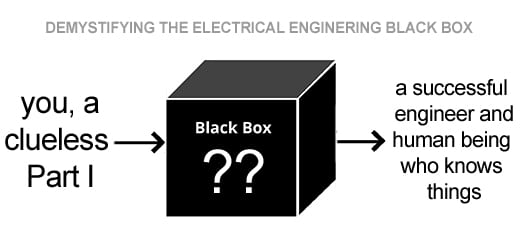We’re hurtling towards midsemester break at an alarming rate. For some, this may be great. For part II electrical/computer systems, it’s absolutely terrifying! It’s not the quantity of due dates for us, but the quality. The most pressing being an interview about our design project thus far.
But, I’m not going to think about that for now. I thought I would write about where electrical engineering takes you (the short answer is to William’s office hours). I chose electrical, knowing it was the specialisation I was most interested in, but not knowing what electrical engineers actually do in New Zealand. Hint: I’m still not entirely sure. I felt like this wasn’t explained clearly anywhere on the internet, which can be said about very few things, so I’m going to try do that. Let’s get into this and try demystify the black box that is this degree.
Electrical engineering is one of the broadest fields that there is. Nearly everything uses electricity and electrical systems in some capacity these days. The great thing is that means electrical engineers are in high demand! Here are the main areas you can get into in New Zealand:
-
- Power Systems Engineering – [planning, designing, maintaining] electrical systems related to electric power generation/transmission/distribution or other infrastructure/buildings that use power. These are generally large scale projects. Think of the transmission lines that span the country or the generation of electricity for an entire region. Think of electric power companies like Transpower, PowerCo, Meridian, Mercury and consultancies like Beca, Aurecon, Stantec, Aecom.
- Electronic/Hardware Engineering – [planning, designing, maintaining] electronics for anything else. Whether that be a robot, a dishwasher, or the next iPhone. Though, likely something a bit less glamorous. Anywhere from a reasonably small scale to a nanoscale. Think of research and development companies like Rocket Lab, Fisher and Paykel, and virtually anywhere else that may need hardware solutions. Sometimes consultancies but less so than power systems usually.
- Postgraduate studies in any subdiscipline of your choosing – for those who like university just a bit too much. Sticking around amongst your most beloved lecturers while learning more and eventually undertaking research. Also, while probably being a Graduate Teaching Assistant to those pesky undergrads.
You could work anywhere from on-site, a factory, a lab, to a formal office, or likely a combination of these things.
To get into these different areas, there are some main pathways you’d want to consider from part III onwards. I’m just going to name bomb a few key electives for now, but you get to choose four in part III:
-
- Power Systems: power apparatus and systems, control systems, fields and waves, applied electronics
- Electronic/Hardware: fields and waves, signals and systems, control systems, applied electronics
But, the great thing, of course, is that you can choose any four electives you like to fit what you want to learn and what kind of role you’d like to have within the main areas. Part II is a great opportunity to figure out what interests you most within electrical.
And lastly, as a completely unrelated comedic bonus,

Here’s a lecturer’s spelling of logarithmic from a coursebook that I often think about. You won’t be able to Ctrl + F this one.
On a more personal note, the current lockdown situation isn’t ideal. Still, I hope everyone is fairing okay and remaining healthy and covid negative for the most part! I’ll see you guys in a little while.
